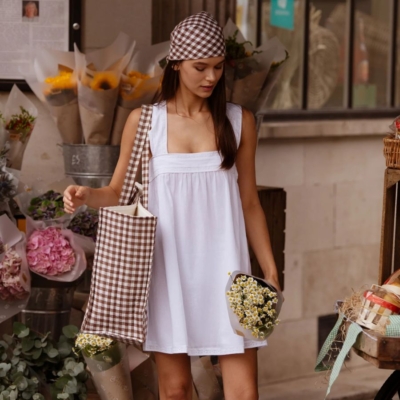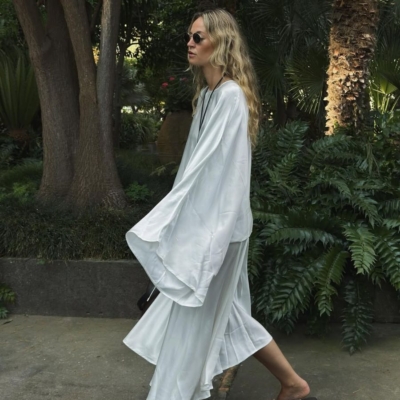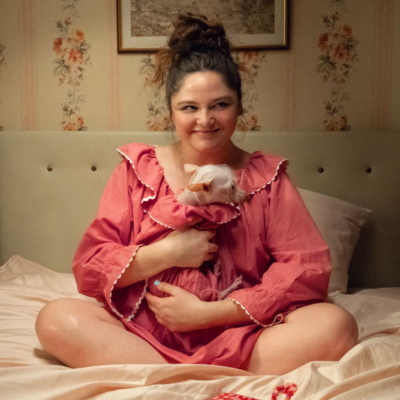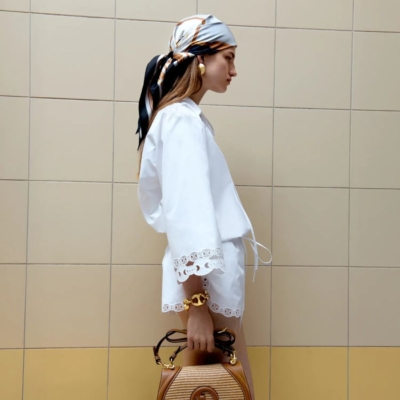Over tea in a garden in Borris, writer Eimear McBride discusses language, literature and sex addiction
“I don’t feel the critical world is open to my writing.” The speaker is Eimear McBride. We are drinking iced water and tea under a parasol in the Steps Hotel garden in Borris, a town in full literary festival fig, which underscores the shock of this statement. This is the Eimear McBride whose debut novel A Girl Is a Half-Formed Thing garnered an embarrassment of critical prizes, including the Goldsmiths Prize for a debut novel and the Baileys Prize for women’s literature. Literary ingrate or loner? Clearly Eimear McBride doesn’t much care for comfort zones.
But then, the closed eye of the critic was long familiar to her: nine years of rejection before “Girl” as she calls it, became a literary sensation. Because of that hiatus, publication of her second novel followed hard on its heels, cutting short the critical honeymoon. Explicit sex is her tool in both novels: through the gutter of squalid bedsits or sodden lakesides, the gut is the voice – hard visceral writing. It’s not surprising that her theme at Borris is sex: differentiating between sexual explicitness and pornography. What surprises is that this is still subversive. “The more interesting writing about sex is coming from women. I wish more men would do it,” she says. Would that change anything with the critics? “They loved Girl, because it was sex as victim; they were less enamoured of The Lesser Bohemians because she was powerful, if vulnerable. When you have a successful first novel, critics feel they know how you should write the next. And writers are not celebrated when they write about sex.”
The buzz around us is of celebrities dashing from event to event: Joanna Trollope’s ineffable elegance in skinny jeans; Paul McGuinness’ cherubic crumple in linens; Dominic West’s perennial cool. Former presidents, poets and pundits – was there ever so much talent dripping in the soporific heat of the midlands sun? If the renaissance of the literary festival is partly social, there’s clearly something else afoot: in our topsy-turvy world, have the great writers anything to say?
We meet in the slipstream of the British election and McBride has fascinating things to say about everything. But the big question is why she, almost alone of her sex, takes such risks, doing what Iris Murdoch called the “close dangerous play with unconscious forces”. She’s mildly irritated that most reviewers attribute a debt to James Joyce, because of her use of stream of consciousness and because she once said that Joyce opened the gates. Like him, language expresses the inner process of character but, impatient with the “slowness of grammatical English,” she smashes it up for her purpose. “I’m interested in the body – the life of the mind is pretty much covered. The Lesser Bohemians is sex under microscope. I feel more related to art than literature.” Egon Schiele’s bruised, half-finished, psychologically charged nudes spring to mind: the critics didn’t celebrate those either.
“I loved acting, especially the language, but I couldn’t be that communal. I realised I could do the language myself.”
One thing is certain, the years of rejection helped shape her art. Her description of Stephen, sex-addicted anti-hero of The Lesser Bohemians – “I was interested in writing about somebody who felt themselves to be a failed human being” – mirrors how she felt about her own epic rejection. “It’s hard to be in your 30s and feel that you have failed at the thing that matters most to you.”
“I’m always asked the autobiographical question,” she says. “But I’m not that girl.” Some similarities however, are evident: like her characters she was raised in the boggy midwest, her father died when she was young and her beloved brother died of a brain tumour. She also went to drama college in Camden where, all auburn and earth like a Rosetti painting, she blossomed. There she met her husband William Galinsky – the hero who supported the writing of “Girl.” In the same place, her protagonist in Bohemians met the older actor and its sex became the language of love.
Ironically, acting started her writing. “I loved acting, especially the language, but I couldn’t be that communal. I realised I could do the language myself.” A move to Norwich, where William was Arts Festival administrator, proved fateful. Henry Layte, the owner of the legendary local bookshop, Book Hive, then expanding into publishing with his Propolis imprint, enquired after McBride and William told it like it was – the despair, the nine years’ rejection. Layte read the book, and gave McBride £600. The rest is history.
The Lesser Bohemians is the first part of a trilogy. Its characters still possess her. “The reason the age gap is there is to show the effect of sex addiction on Stephen, the shadow of his own abuse and what he’s done to himself to cope with it. A lot of men feel very broken about their sex lives. If it involved a lot of sex, that’s seen as something to proud of, but it can be hugely destructive.”
Addiction is the brackish undercurrent of everything she writes. On the traditional female addiction, she’s almost lyrical: “Women can’t even indulge a food addiction without shame being put on them. Food addiction doesn’t interfere with their role as keeper of the house, as tender of the husband’s whims. They still pick up the kids.”
But something else drives her writing. It emerges in her passion about “the Tory arrogance of ignoring the huge swathe of the population who voted Remain”. Or the anti-Semitism of the hard left in Labour. Or the plight of British Muslims. “I stand with the Muslim people. The Irish community in Britain should be more vocal, they can contribute a lot.” This is the voice of the conscious emigrant. Like her parents, she has gone and come and gone from Ireland. “Norwich has been very good to me,” she says, but now she and William and their five year-old-daughter are heading south again, to her beloved London. For the writer, like the emigrant, there is no home but Earth. For McBride, no comfort but art.
Illustration by Lauren O’Neill
LOVETHEGLOSS.IE?
Sign up to our MAILING LIST now for a roundup of the latest fashion, beauty, interiors and entertaining news from THE GLOSS MAGAZINE’s daily dispatches.










